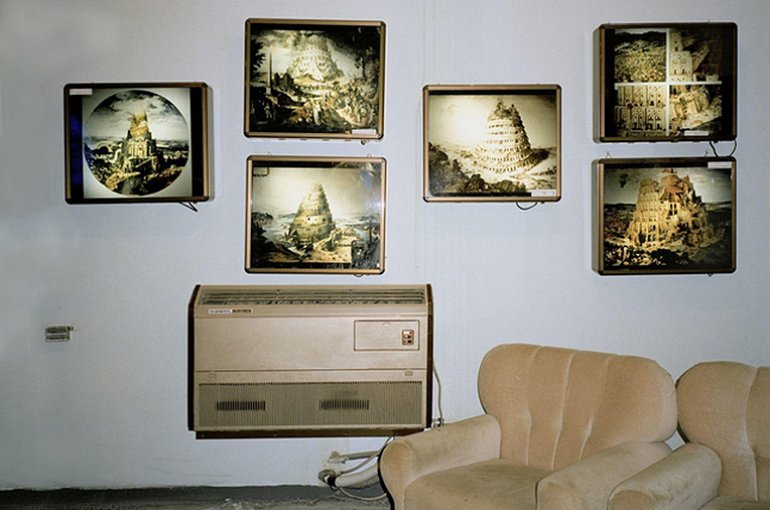CfH and BAK present: Future Vocabularies/Human-Inhuman-Posthuman

If art, science, and the humanities have shared one thing, it was their common engagement with constructions and representations of the human at the center of their respective realms. Contemporary concerns however - such as neoliberal economics of global capitalism, migration, techonological developments and mass environmental destruction - evoke dramatic transformations in the concept of the human as we know it. In collaboration with the Centre for the Humanities, BAK (Basis voor Actuele Kunst) presents 'Future Vocabularies/Human-Inhuman-Posthuman', a programme that aims to interrogate the ‘posthuman condition’.
Through a series of lectures, masterclasses and arts projects, the posthuman condition is approached as a set of exciting new developments as well as a troublesome reiteration of old, unresolved problems. Realised in collaboration with Director of the Centre for the Humanities and BAK Research Fellow Prof. Rosi Braidotti and the BAK team, this semestral program outlines potential artistic, intellectual, and activist itineraries of working through this complex reality, and attempts to create an understanding of the altered meanings of art vis-à-vis such critical present-day developments.
Programme
Future Vocabularies/Human-Inhuman-Posthuman/Anthropocene Observatory
A research exhibition, Anthropocene Observatory, is realised at BAK by the collaborative team of Territorial Agency (Ann-Sofi Rönnskog and John Palmesino, London), artist Armin Linke (Berlin), and curator Anselm Franke (Berlin). The exhibition is accompanied by talks by Territorial Agency, philosopher Bruno Latour (Paris), and others.
- 7 February–26 April
Life-hack #1: ‘How to be seen’ with Saskia Sassen
This event is part of the Hacking Habitat art manifestation. Prof. Saskia Sassen (Columbia University and London School of Economics) will give a public lecture on ‘(In)Visibility in Society’.
- 9 April
- TivoliVredenburg, 20.00 hours
- Tickets: €10. Group discounts for students (groups of 12, 18 or 24) are available, please send an email to sonia@hackinghabitat.com.
- For more information, please visit the Facebook event.
Intensive seminar with Saskia Sassen: 'Expulsions in the Time of Global Economy'
This intensive seminar will be based on Sassen’s latest book Expulsions: Brutality and Complexity in the Global Economy. Participants of the seminar will have a chance to discuss the main lines of Sassen’s argument and raise questions that they will have prepared in advance, based on the reading material and their own research interests.
- 9 April
- 11:00 hours in Utrecht (location to be announced to participants)
- Event is free of charge, but registration is compulsory. Please send an email with your cv and a short motivation by 27 March 2015. Please note that the number of places is limited.
Future Vocabularies/Human-Inhuman-Posthuman/Posthuman Glossary
The exhibition 'Anthropocene Observatory' is followed by a cluster of seminars, master classes, and workshops with academics, artists, and activists. As the second part of the Human-Inhuman-Posthuman trajectory, a series of four gatherings takes place around the critical issues of posthumanity (such as algorithmic cultures and security, Anthropocene/Capitalocene, eco-sophies, and digital activism), in present-day artistic and intellectual work.
- Dates: 21–22 May on Anthropocene/Capitalocene; 28–29 May on Eco-Sophies; 11–12 June on Digital Activism; and 18–19 June 2015 on Algorithmic Cultures and Security.
- Chair of all the sessions: Prof. Rosi Braidotti
- Registration: please register by email for each particular session.
Contributing speakers include:
- Manuel Beltrán (artist and activist)
- Ursula Biemann (artist, www.geobodies.org)
- Keti Chukhrov (artist and scholar, Russian State University for the Humanities)
- Rick Dolphijn (Department of Media and Culture Studies, Utrecht University)
- Matthew Fuller (Centre for Cultural Studies, Goldsmiths College, University of London)
- Mark B.N. Hansen (Duke University)
- Erich Hörl (Institute of Culture and Aesthetics of Digital Media, Leuphana Universität Lüneburg)
- Katarina Kolozova (Institute of Social Sciences and Humanities Research, Skopje)
- Geert Lovink (Institute for Network Cultures)
- Jussi Parikka (University of Southampton)
- Luciana Parisi (Goldsmiths College, University of London)
- Matteo Pasquinelli (independent scholar)
- Gerald Raunig (Zurich University of the Arts)
- Mirko Tobias Schäfer (Utrecht University)
- Timotheus Vermeulen (Radboud University Nijmegen)
View the more detailed programme (pdf).

